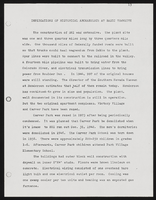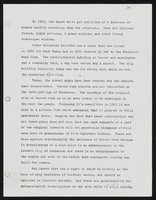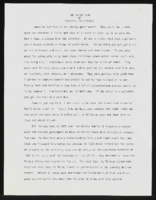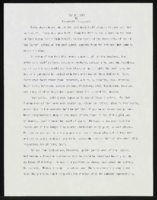Search the Special Collections and Archives Portal
Search Results



"The Sunset Kid": article draft by Roosevelt Fitzgerald
Date
Archival Collection
Description
From the Roosevelt Fitzgerald Professional Papers (MS-01082) -- Drafts for the Las Vegas Sentinel Voice file. On unacknowledged Black cowboys and soldiers.
Text
Armstrong, Sammie R., 1942-
Sammie Ross Armstrong was the owner of Ray and Ross Transport, the largest minority owned company in the state of Nevada during the 1980s and 1990s. In addition to being the second largest bus company in Clark County, Ray and Ross Transport, employed over 180 people and paid higher wages to their drivers than any other West Coast company. The company was voted one of the Top 5 most well run and safest bus companies of that era and owned more than 40 buses.
Person

Sonny V. Mallari oral history interview: transcript
Date
Archival Collection
Description
Oral history interview with Sonny V. Mallari conducted by Chanele Mallari on November 26, 2021 for Reflections: The Las Vegas Asian American and Pacific Islander Oral History Project. Sonny Mallari talks about his childhood in Masantol, Pampanga province, Philippines with his five siblings. He discusses his family's immigration to Salinas, California and details of his life and parents' lives in the United States. Sonny shares stories of being bullied in school and what the immigration process was like from his point of view at the age of seven. He also talks about his professional work as a cook, moving to Las Vegas, Nevada for work, and becoming a Culinary Workers Union member.
Text

"The Recruit": article draft by Roosevelt Fitzgerald
Date
Archival Collection
Description
From the Roosevelt Fitzgerald Professional Papers (MS-01082) -- Drafts for the Las Vegas Sentinel Voice file. On colleges needing to recruit Black faculty like they recruit Black athletes.
Text

Maria Benítez oral history interview: transcript
Date
Archival Collection
Description
Oral history interview with Maria Benítez conducted by Monserrath Hernández and Maribel Estrada Calderón on June 21, 2019 for the Latinx Voices of Southern Nevada Oral History Project. Maria Benítez is the image of a hardworking and determined Salvadoran woman. After facing adversity amidst the Salvadorian Civil War she talks about her journey as a nurse in El Salvador and migrating to the United States. Here in Las Vegas, she has worked as a cook on the Strip, been an active member of her church, and supported the education of her children selling pupusas. Subjects discussed include: El Salvador, Salvadorian Civil War, Migration, US Citizenship Documentation, and Judaism.
Text

Gwen Weeks Rahner interview, March 06, 1981: transcript
Date
Description
On March 6, 1981, Laronda D. Tinsley interviewed Gwendolyn Weekes Rahner (born August 14th, 1923 in Atlantic City, New Jersey) at her home in Las Vegas, Nevada. In this interview, Mrs. Rahner discusses working in politics and registering people to vote in Las Vegas, Nevada. She also discusses living in West Las Vegas and her experiences there.
Text

Transcript of interview with Vincent Kethen by Claytee White, December 23, 2009
Date
Archival Collection
Description
In 1964, the year that Vincent Kethen was born, desegregation of Las Vegas schools began. Like many African-American children living in the Las Vegas Westside neighborhood, Vincent was bused out of his neighborhood in third grade to attend a white school. In his case, this meant attending John S. Park Elementary and later other predominantly white schools. He talks about these experiences. John S. Park was a neighborhood of manicured lawns, while the school bus and the classroom were places fraught with fisticuffs. The experience of growing up during that era are recalled. Vincent provides a sense of that it was like to reside in his home neighborhood and the onslaught of the drug culture altered gang-lead neighborhoods. Being bused had positive results he explains, such as athletics, which served as an equalizer. For Vincent, a solid upbringing, which included love of church and the chance to attend college, encouraged him to make good decisions about his future. He received a four-year degree and he returned to Las Vegas to "give back." For over a decade and a half, her has coached young basketball players and helped them see their options for a brighter future than they might otherwise have seen.
Text

Transcript of interview with Samuel and Sherrill Coleman by Claytee White, February 12, 2016 and February 22, 2016
Date
Archival Collection
Description
Sherrill and Samuel Coleman moved to Las Vegas during the 1990s after both enjoying a full life and numerous careers in other parts of the United States. They met each other through church in 1998 and married each other in April 1999. Now retired, both Samuel and Sherrill remain active in their church community. Samuel Coleman was born in Durant, Mississippi in 1928 to a sharecropping family. His father died when he was 13 months old, leaving his mother to raise seven children by herself. Over time, his family slowly migrated to Chicago and he joined them when he was 15. For eight months, Samuel worked a number of different jobs until he began to work for Burlington Railroad as a four cook. The United States Army drafted him in 1951 and sent him overseas to work in a motor pool for a military hospital in Korea, despite his status as a conscientious objector. At war’s end, he returned to work for Burlington. During his last 17 years with the railroad, Samuel successfully petitioned to join the Brotherhood of Sleeping Car Porters, the union for railroad cooks, porters, and waiters, to improve the working and sleeping conditions at Burlington Railroad. He retired from the railroads in the 1970s and chose to pursue other careers. Until his official retirement in 1993, Samuel worked in real estate, as the owner of a liquor store, a firefighter, a restaurant inspector, and a deacon for his church. His daughter from his first wife moved to Vegas to pursue a career as a teacher and after a number of visits, Samuel decided to follow her in 1999. Sherrill Coleman was born in Newton, Kansas in 1941. Like many other African American women in her community, she worked as a housekeeper for a number of years. She and her first husband moved to Los Angeles County in 1964 where she took a temporary job in the elections department of the local government. In 1967, Sherrill became a file clerk for Los Angeles County’s Department of Public Social Services. By the time she left the department, she was middle management in the auditing department. She moved to Vegas in 1993.
Text
